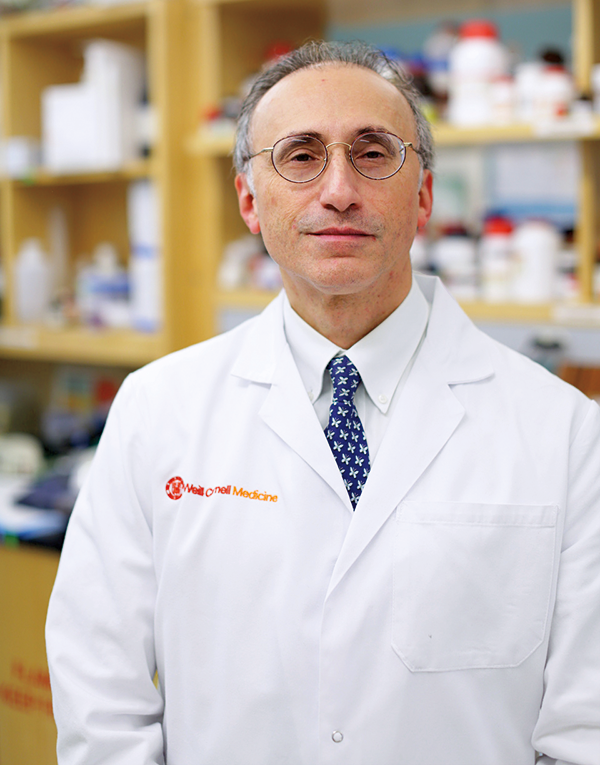
Board of Fellows member Alan Hartman and his wife, Kim
With a generous gift of $10 million from Board of Fellows member Alan Hartman and his wife, Kim, Weill Cornell Medicine will establish a multidisciplinary research institute to advance organ regeneration and repair.
The Hartman Institute for Therapeutic Organ Regeneration will expand the frontiers of stem cell-based research and organoid development, creating a hub within Weill Cornell Medicine’s Division of Regenerative Medicine that will facilitate collaboration among researchers, clinicians, surgeons and entrepreneurs. Scientists in the division have already devised game-changing technologies to fully realize the promise of tissue-specific organoids for repairing injured and malfunctioning organs – and with the support of the Hartman gift, Weill Cornell Medicine will work to translate those discoveries to patient care.
The Division of Regenerative Medicine, in the Joan and Sanford I. Weill Department of Medicine, is led by Dr. Shahin Rafii, the Arthur B. Belfer Professor in Genetic Medicine, a professor of medicine and of reproductive medicine, and director of the Ansary Stem Cell Institute.
The Hartman family’s gift will bolster a key priority area of Weill Cornell Medicine’s We’re Changing Medicine campaign, fortifying the institution’s commitment to develop breakthrough, personalized therapies that will improve lives. The institute is named in honor of Larry Hartman, Alan’s father, who passed away last summer.
“Millions of people succumb to organ failure annually, across a multitude of diseases,” says Alan, who is a vice chair of the Board-appointed Campaign Executive Committee, the leadership body of the We’re Changing Medicine campaign. “Nothing would make my father happier than being part of a bold, new initiative that could save countless lives and reduce families’ suffering.”
“Kim and Alan Hartman’s visionary philanthropy will one day make cell therapeutics commonplace in patient care,” says Dr. Augustine M.K. Choi, the Stephen and Suzanne Weiss Dean of Weill Cornell Medicine. “The Hartman Institute has the potential to change medicine on a global scale, and we are tremendously grateful for their support.”

Dr. Shahin Rafii
For the Hartmans, the institute offers the promise of improved health without the bittersweet experience that can surround organ donation. Even though nearly half of all organ transplants come from living donors, many organs are often donated as the result of a tragedy. “It would be wonderful to eliminate the sadness that often surrounds organ transplants,” says Kim. An organ regeneration program, such as the one proposed by the Hartman Institute, would proactively help save lives. Lab-created organoids, grown from patients’ own stem cells, can be made to resemble a variety of human organs, and can also be assembled into tissue-specific organoids for use in the surgical repair of organs that are not fully functional.
“This is truly cutting-edge science and an area where Weill Cornell Medicine is an unquestioned leader,’’ says Alan. “To be successful in this emerging field requires world-class researchers, like Dr. Rafii, clinical expertise and proximity to a premier medical center. Weill Cornell Medicine is positioned to succeed in such an endeavor.”
“Thanks to the generosity of Kim and Alan Hartman, this unique institute will have a profound impact on the future of regenerative medicine,” says Jessica M. Bibliowicz, chair of the Weill Cornell Medicine Board of Fellows. “This initiative truly exemplifies our commitment to innovative research and therapies as a means of achieving optimum health.”
The Hartman Institute represents the We’re Changing Medicine campaign’s commitment to investing in our research enterprise to affect the lives of our patients. With research as a cornerstone of the campaign, Weill Cornell Medicine will elevate the standard for clinical care through the creation of a world-class precision health enterprise that uses breakthrough data science to personalize prevention and care.
Priority areas for the Hartman Institute will include gastrointestinal diseases, pulmonary diseases, cardiovascular dysfunction, neurological disorders and stroke, and diseases affecting the metabolic system, with the recruitment of specialists in these disciplines who will engineer organoids for regeneration, with a goal of making this therapy accessible to all patients.
The Hartmans and their children (Katie, Max and Andy) believe their new gift to Weill Cornell Medicine aligns perfectly with their family’s philosophy of philanthropy. And they are looking forward to a fruitful and involved relationship with the Hartman Institute in the years to come. “We are really motivated to support change-makers,’’ says Kim. “It’s taking a leap of faith and supporting people who will make an impact on the lives of others.”
